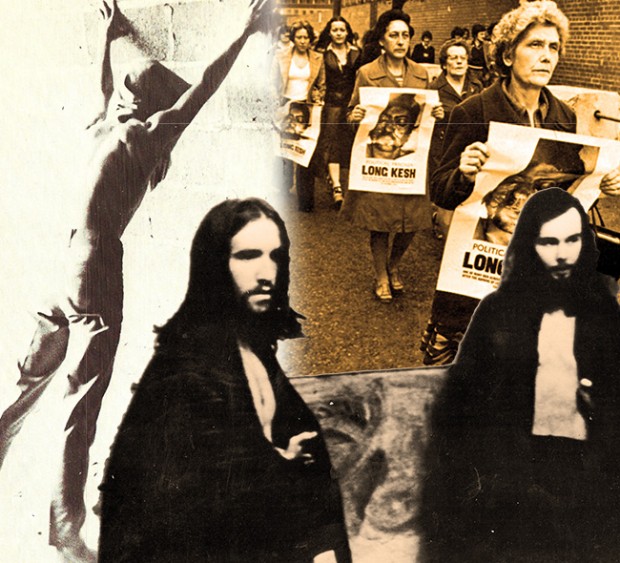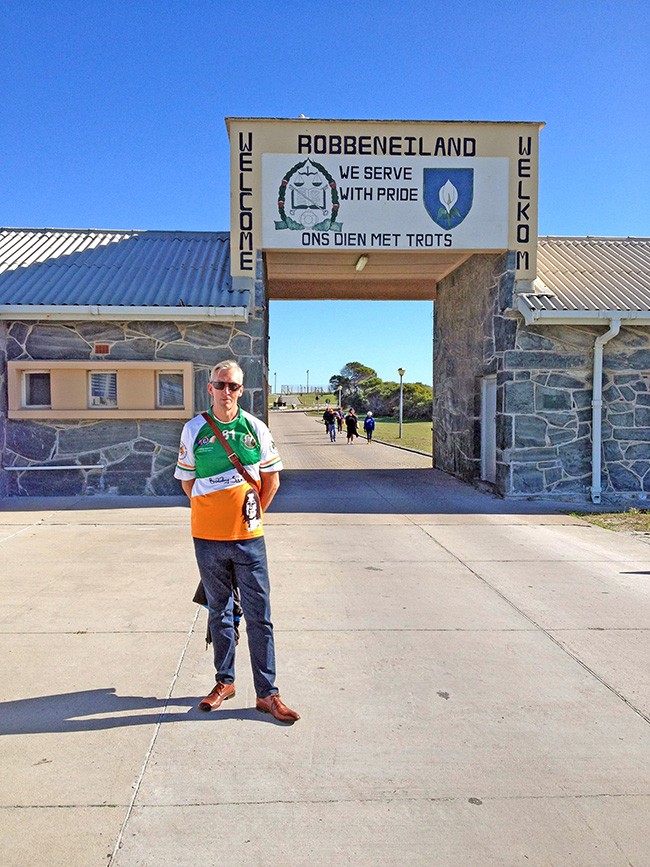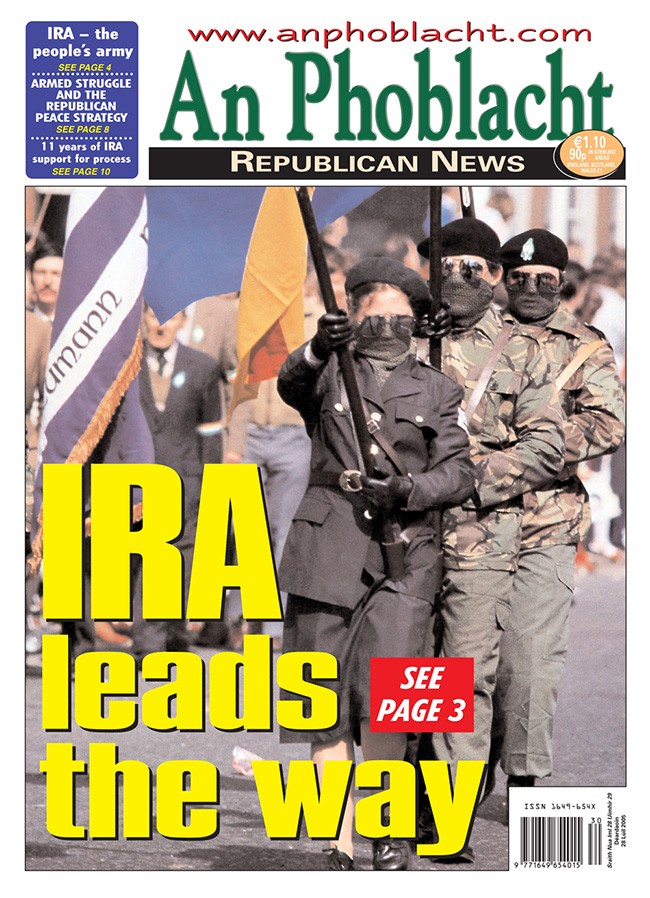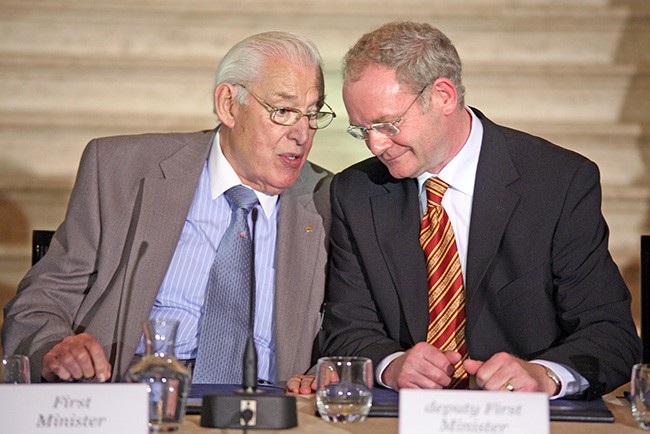13 February 2017 Edition
Reconciliation and living a republican politic
UNCOMFORTABLE CONVERSATIONS

• Do I have to become reconciled with the prison guard who casually brutalised us on a daily basis over the years of the Blanket Protest?
I want to begin by saying that I have absolutely no interest whatsoever in the concept of reconciliation
I BEGAN to write this article before Christmas in response to the relaunch of Sinn Féin’s policy document on reconciliation. Events in the North since then with the resignation of Martin McGuinness as deputy First Minister, thus precipitating the collapse of the Assembly at Stormont, could be said to now have made such an article redundant. I believe, however, for the purposes of political and intellectual clarity, that the subject should still be addressed.
I want to begin by saying that I have absolutely no interest whatsoever in a concept of reconciliation. That may sound strange to those who know of my work over the last two decades, which involved taking part in numerous ‘uncomfortable conversations’ with a very broad range of individuals, groups, and organisations.
As a staff member from 1998 to 2007 of Coiste na nIarchimí, the umbrella organisation for former IRA prisoner support groups, I was part of a team of ex-prisoners who conducted an outreach programme with former loyalist prisoners, former republican prisoners not affiliated to the IRA, unionists, the Protestant churches, the Catholic Church, the trade unions, women, youth, and business.
As a member of Healing Through Remembering since 2004, an organisation founded to help deal with the past, I have met and engaged with a very diverse range of people.
In the Aftermath project (www.aftermath-ireland.com) I assisted others to tell their stories of the conflict. These included former Royal Ulster Constabulary officers, former British Army personnel, victims of IRA attacks, a family representing ‘The Families of the Disappeared’, as well as republican former prisoners and activists.
My most recent play produced by Kabosh Theatre, Green and Blue, is based on interviews with former gardaí and former RUC officers and is told from their perspective.
Yes, I’ve engaged in the ‘uncomfortable conversations’, enjoyed them, and learned a lot from them. I’ve also built many friendships out of such engagements.

• Laurence McKeown on Robben Island during a recent tour in South Africa of his play, 'Those You Pass on the Street'
My motivation for engaging in such discussions and artistic works has never been for the purposes of reconciliation (whatever that word means) but because it is my lived (Irish republican) politic.
I firmly believe in ‘An Ireland of Equals’ and those ‘equals’ include those who were once our enemies and/or those who have once injured us, or we them. As Irish republicans it is essential we engage with them, as we have been kept separate from them for so long either due to the conflict or to partition.
If someone decides not to meet me, shake hands with me, have a cup of coffee with me, or whatever because of my background, then so be it. I will continue to live my life according to my politic, principles, and value system and will not alter my way of being in the world in response to the behaviour and/or attitude of others towards me.
I neither seek reconciliation nor do I offer it. If, however, as a result of engaging in ‘uncomfortable conversations’ there develops a greater understanding, awareness, friendliness, and mutual respect, then that is great. It is all we need ask for.
If someone wants to call that reconciliation, that is their term. I call it a lived politic – good manners, respect, civility.
The suggestion that only in a united Ireland will there be full or true reconciliation is, for me, a totally erroneous statement not founded on anything other than wishful thinking. If there was a united Ireland tomorrow there would be those who would have major difficulties with it, be it from a socio-economic, political, historical or cultural perspective.
Are we to believe that in a united Ireland former enemies will suddenly embrace one another as the ‘fog of false consciousness’ is lifted? Of course not. I do understand the sentiment behind it though: that only in a united, independent Ireland can we demonstrate that everyone can be treated as equal. And that should be our goal – not some idea of reconciliation. It should be the creation of a society that treats everyone with justice, equality, and respect. Liberty, equality, fraternity.
And why should people be reconciled? Or why do we think that a good thing?
Should the person abused, either in a domestic or institutional setting, become reconciled with their abuser? Would we ever ask or demand that?
Do I have to become reconciled with the prison guard who casually brutalised us on a daily basis over the years of the Blanket Protest? No. But I do have to work for a society that treats him and his children as equal in every respect and in exactly the same manner as I wish to be treated and my children to be treated. As Bobby Sands wrote: “Let our revenge be the laughter of our children.”
And what of intra-community reconciliation (if we are to use the ‘reconciliation’ term) rather than inter-community or cross-community?
What of those living within republican communities today who have had family and loved ones killed by republicans during the struggle? Or had their houses taken over, or cars and tractors regularly taken for IRA operations? I don’t see any indication whatsoever of attempts to become ‘reconciled’ with them or to ‘explain’ our actions during that period. And yet that would be a process that would probably lead to much better results. It certainly would not be disempowering in the way that attempting to get unionists to reciprocate to republican gestures is.
Following the announcement of the IRA cessation in 1994 there was a period of much confusion amongst republicans. ‘What now? What deal was made? Surely we could not end 25 years of intensive struggle on a whim and a prayer? There must be some quid pro quo?’ It took some time to realise there wasn’t. And therein lay its strength. We, the republican community, were beholden to no one. We would act as we seen fit and as and when we decided to do so. Others could respond as they wished. That was their prerogative.

To call the cessation was one of the most courageous decisions the IRA Army Council ever made. It reflected a confidence in themselves and in our people.
More importantly, it unleashed an incredible period of debate and discussion.
It showed that things could change, that things had changed and would never be the same again. Even when the cessation collapsed two years later, everyone knew it would be reinstated at some point. A change in perspective had occurred. It was never again going to be the ‘same old, same old’ ever again.
A similar shift in mood took place within the nationalist/republican community in the North when Martin McGuinness announced that he was resigning his position as deputy First Minister.
Unfortunately, some in the DUP had mistaken good manners and civility as weakness and thought they could adopt the behaviour of their forefathers (and they were fathers/male) during the ‘glory days’ (sic) of the Stormont regime 1921-1972.
There was a palpable sense of ‘never again’ as Martin – referring to the manner in which unionists had (mis)treated elected Sinn Féin members of the Assembly – said, “There will be no return to the status quo.”
But things have also now shifted at a societal level, and not in a way that anyone could have predicted.

• Martin McGuinness and DUP leader Paisley Snr together led the power-sharing Executive
Martin’s announcement that he would not be a candidate in the forthcoming elections and was now focusing on recovering his health led to an outpouring of genuine sympathy and best wishes from the Protestant community which surprised many – I would imagine not least within the leadership of the DUP.
It is much too soon to say how that will effect, if at all, the results of the upcoming Assembly election and the future of the institutions but it is an indication of how much people have valued his contribution to the Peace Process, how much they admire the manner in which he conducted himself in office, and the degree to which they found him personable, honest, civil, and courteous – the way they found him to be a leader who didn’t ever run away from the difficult conversations and the even more difficult decisions that had to be made.
Martin put into practice the true Irish republican politic – respecting others in ‘An Island of Equals’ if still a partitioned island. The result of living that personal politic endeared him to so many. If some wish to call that reconciliation, fine. I call it living a republican politic.
We shouldn’t ask for a quid pro quo in terms of how we live our lives, the decisions we make, how we treat others, and the policies we follow. Neither do we ask permission. If we follow our politic the rest will follow (call it reconciliation, if you will) as it will follow Martin to the end of his days. Leader, statesman, diplomat, peacemaker.
Laurence McKeown is a former political prisoner (1976-1992). During that time he took part in the protests for the return of political status and spent 70 days on hunger strike in 1981 in the H-Blocks of Long Kesh. Upon his release Laurence completed a doctoral study at Queen’s University and is now an author, film-maker and playwright.
Editor’s Note: Guest writers in the Uncomfortable Conversations series use their own terminology and do not always reflect the house style of An Phoblacht.




